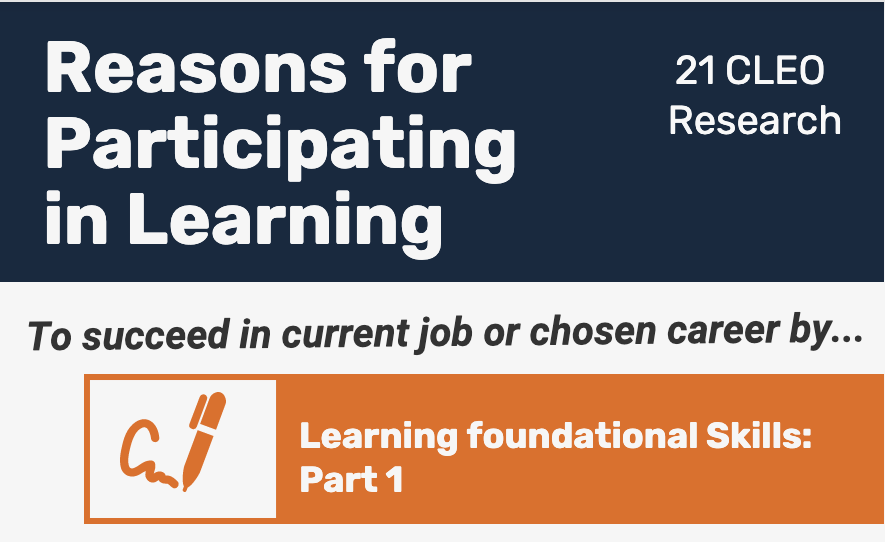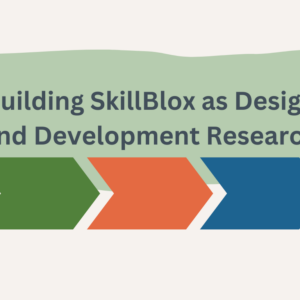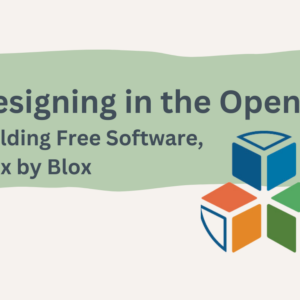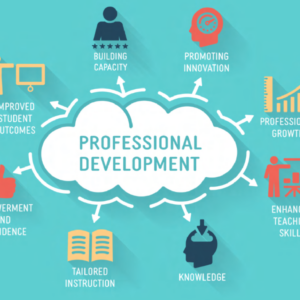By 21CLEO Research Team
Lately, we have been focused on the creation of personas, where aspects of real people are captured and blended in order to create one story that illustrates a broader representation of an end user of a technology or participant in a course. In past blogs we talked about how we are using persona as a research tool and our process for creating personas. In the next several blogs we will present the personas we have created based on our interviews with working learners.
Why Persona?
In our research, we center the voices of working learners, and personas offer some structure for creating snapshots of the diverse group of participants. This is important because much of the literature that we’ve reviewed situates working learners as passive recipients of education or training. This perspective is reflected in common language used, including “upskilling” as in “upskilling our workers” which suggests that learning is something done to employees. After talking with many working learners, our insights push back against that view. We’ve seen how working learners display their agency; they make strategic choices about where they want to put their effort and time when it comes to participating in employer supported learning opportunities.
Additionally, our data have made clear that these working learners are not a monolith. They come from many different backgrounds and have a wide variety of goals for participating in employer supported learning opportunities. Our data show that some learners participate for a range of reasons, as illustrated in figure 1, above. These reasons include building foundational skills such as English language proficiency, satisfying a job requirement, or taking advantage of learning opportunities in order to earn a degree or certificate. The personas that we present in this and the next few blogs help to provide nuance to our understanding of working learners and illustrates the complexity of working learners’ lives. In this post we talk about a persona reflecting learners working on foundational skills.
About Alimayu: a college-educated worker learning English
Alimayu represents many of the working learners who we interviewed. As an English language learner he is building foundational skills to succeed at work. We hope that meeting Alimayu helps employers, HR professionals, teachers, program developers, and others in the learning ecosystem better understand the perspectives and experiences of working learners. Here are the highlights of this persona (see figure 2).

Alimayu graduated from a 4-year university with a degree in information systems in his country of origin. He currently works in retail. His employer offers a once-a-week English class on site, which he attends. Alimayu’s supervisor schedules him so that he is working during the class time which means that he gets paid for his class time.
In his retail job, Alimayu uses English with customers and co-workers. His earlier English learning was with British English, so he is especially interested in learning American English pronunciation because the differences trip him up sometimes. He sees learning English as a stepping stone to getting back onto his career path in information systems.
His biggest barriers are time and money. He works two jobs, often 16 hours a day so he has little extra time. He tried to enroll in English classes at his local Adult Basic Education program but the classes meet during work hours, and they are expensive. Alimayu supports his family and he also sends money to family in Ethiopia.
He often uses the internet for independent learning with a computer or smartphone and he has wifi at home. He gets frustrated when he hits a paywall with internet-based resources.
“I work 2 job you know, 16 hours per [day]… You have to support your family at the same time [send money] back to home yeah so actually the main thing is the time, we don’t have time.” ~ Alimay
Alimayu, like many other working learners, demonstrates agency in his educational choices and devotes time to independent learning, even when he’s balancing many other responsibilities. In our next blog post, we’ll explore the characteristics of a learner who doesn’t have a college degree, and doesn’t get paid for the time they engage in learning to advance their career choices.
We look forward to continuing the conversation through your comments and connections. Read more about our 21st Century Learning Ecosystem Opportunities (21CLEO) research here.




